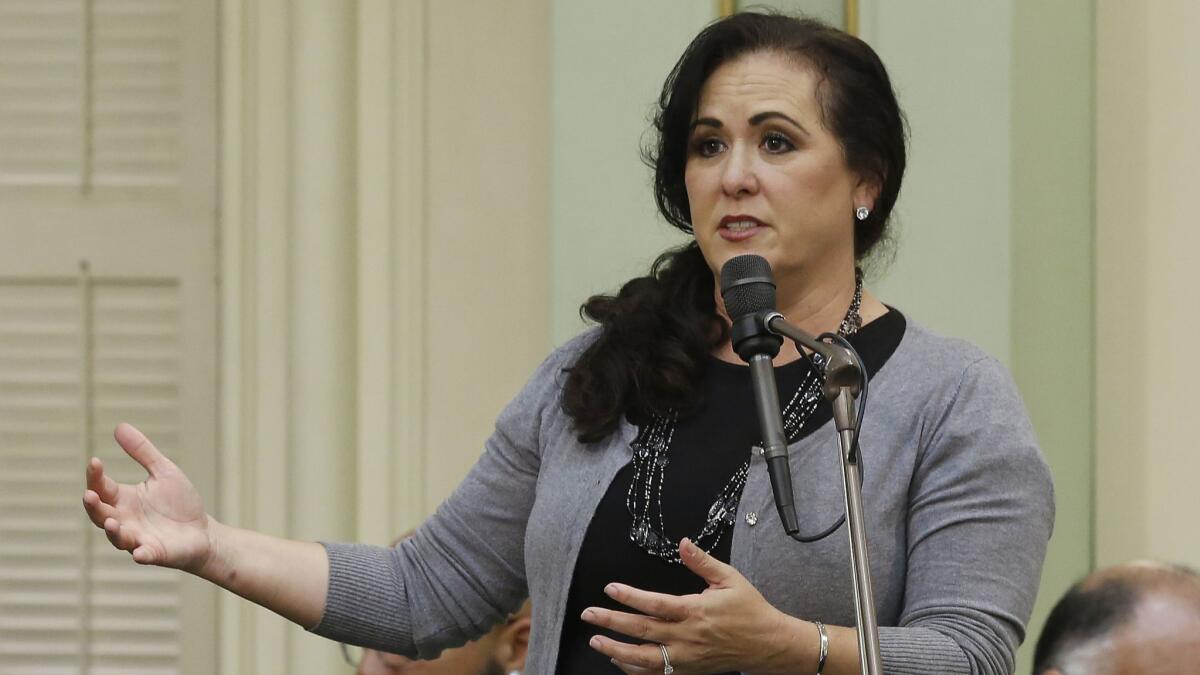No, we shouldn’t dip into California’s unemployment funds to help striking workers

- Share via
The labor movement in the United States is enduring a deep and well-documented decline, buffeted by the rise of globalization, a steep drop in factory jobs and the spread of union-weakening policies to more than half the states, among other forces. Unions have fared somewhat better in California, where the falloff in union representation has been modest since 2000 — in part because labor-friendly Democrats have dominated state government. Yet even here, labor can struggle for leverage when going toe-to-toe with powerful corporate employers; witness, for example, the desultory results for grocery workers in Southern California after a bruising 20-week strike in 2003-04.
Hoping to improve the unions’ odds, Assemblywoman Lorena Gonzalez (D-San Diego) has proposed to extend unemployment benefits to workers who go on strike and stay out for four weeks or more. According to Gonzalez, Assembly Bill 1066 would provide workers “with a basic safety net to ensure they are not starved back to work by their employer, that they have the means to stand up for fair treatment on the job and can have a basic level of income to provide for their families during a labor dispute.”
The benefits would be available to public employee union members too, although many of them are barred by law from striking. It’s not a novel idea — both New York and New Jersey allow striking workers to collect unemployment benefits after a multi-week waiting period. Under Gonzalez’s bill, any strikers, regardless of the reason for the strike, would be eligible if they were out long enough.
Those statistics are an argument for stronger unions, but not for the kind of support promised by AB 1066.
It’s easy to sympathize with Gonzalez and the unions on this issue. The widening gap between the wealthiest Americans and average wage-earners demonstrates that the fruits of U.S. economic growth aren’t being well shared. So does the income stagnation experienced by millions of Americans on the lower rungs of the economic ladder. The top 1% of income earners are capturing far too great a percentage of the gains, and that’s bad for everyone — it’s slowing the engine of the U.S. economy.
Those statistics are an argument for stronger unions, but not for the kind of support promised by AB 1066. The fundamental problem with the measure, which is sponsored by the California Federation of Labor, is that it would dip into a fund that was designed to help workers idled through no fault of their own to protect employees who still have jobs but want better terms.
Unemployment insurance is funded by a tax on employers that’s applied to the first $7,000 paid per employee per year. When layoffs surge statewide, as they do in recessions, the tax rate goes up to compensate for the increase in benefits paid and keep the insurance fund from running dry.
Enter the Fray: First takes on the news of the minute »
The point is to provide a small amount of help to laid-off workers — $450 a week or 50% of the individual’s previous salary, whichever is lower — that helps them stay afloat without sapping their incentive to find a new job. That’s a pathetically small amount, considering the state’s cost of living. And yet the state’s insurance fund couldn’t afford to pay even that much during the last recession, forcing the state to borrow billions of dollars from the federal government in order to satisfy the need. It paid off that debt last year, but employers are still being assessed the maximum tax rate plus a 15% surcharge because the fund is dangerously low on reserves.
To supporters of AB 1066, employers should bear the extra costs that the bill would impose because strikes are invariably the employers’ fault. But it goes too far in tipping the scales. Asking employers to subsidize their striking workers from funds that are already insufficient to help the unemployed is not a fair or appropriate way to help rebuild a robust labor movement.
Going out on strike is a risky sacrifice, and workers don’t take that step absent some powerful motivation in the workplace. But that’s why unions have strike funds — to support their members as they fight for better contracts. The state has an unemployment insurance system to assist the unemployed, who don’t get enough help as it is. The Legislature shouldn’t tap it for other purposes.
Follow the Opinion section on Twitter @latimesopinion and Facebook
More to Read
A cure for the common opinion
Get thought-provoking perspectives with our weekly newsletter.
You may occasionally receive promotional content from the Los Angeles Times.









